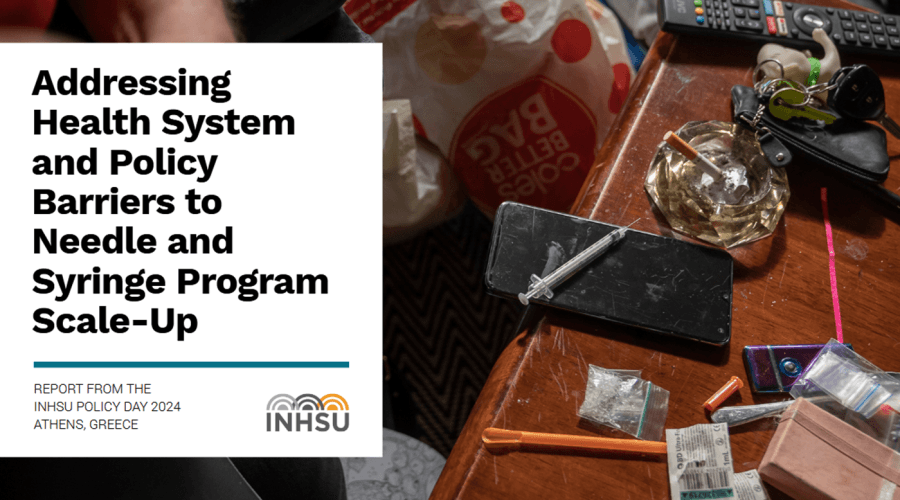 Credit: INHSU
Credit: INHSUNeedle and Syringe Programs (NSPs) are among the most effective harm reduction interventions available. Yet globally, they remain under-implemented due to outdated policies, suboptimal procurement processes, and constant underfunding.
A new report from the International Network on Health and Hepatitis in Substance Users (INHSU) provides a clear, evidence-based roadmap to help overcome these barriers.
The report follows INHSU’s 2024 Policy Day in Athens, where 54 stakeholders from multilateral and global health organisations, governments, academic and research institutions, and community-led networks of people who use drugs came together to co-design solutions for scaling up NSPs.
Participating organisations included the World Health Organization (WHO), INPUD, UNAIDS, The Global Fund, Mainline, Médecins du Monde, INPUD, and TB HIV Care among many others.
Using an implementation science framework, developed in partnership with Assistant Professor Guillaume Fontaine, McGill University, Canada and Associate Professor Natalie Taylor, UNSW Sydney, Australia, participants tackled barriers across three domains:
- Global policy
- National policy
- Procurement
Funding cuts cast a shadow
The report’s recommendations were developed before the recent announcement of the United States’ intention to withdraw from the WHO, alongside major funding cuts to USAID and PEPFAR and a broader trend towards declining international aid globally.
These shifts pose an immediate threat to the global harm reduction infrastructure, with some services already reporting closures and reduced access to interventions such as NSPs and opioid agonist treatment (OAT).
“The recommendations in this report remain essential,” says Emma Day, Executive Director at INHSU. “But we also need to acknowledge the political and funding shifts now taking place. We’re entering a period of shrinking resources and declining international aid. That makes strategic prioritisation more important than ever— understanding what barriers are hindering access or scale up and then directing efforts towards specific solutions.”
Implementation science can help services navigate this new reality by strengthening the impact of harm reduction interventions and ensuring they’re delivered efficiently, sustainably, and in partnership with communities.
Five insights from the report:
- Community engagement is essential: People who inject drugs should help choose NSP equipment and estimate what’s needed. Their input makes services stronger and more effective
- Implementation science strengthens strategy: Using structured, evidence-informed frameworks can help identify priority barriers and map out practical solutions — what works, in which settings, at what cost. This process can easily be replicated or adapted to suit different contexts
- Political will and sustained investment are non-negotiable: Scaling up NSPs requires long-term funding commitments and policy support at both national and global levels
- NSP products must be high-quality and preferred by people who will use them: Requests for commodities must reflect preferences of local communities and NSP suppliers should agree on quality standards and fair pricing for preferred products
- Coordinated messaging and shared goals will accelerate progress: A multi-stakeholder push can support governments in adopting and scaling NSPs. There are education and technical assistance needs but together they can be met
Download the report
Download the one-page overview
Source : INHSU
Related HIV and Co-Infections News
-
[Press release] Health GAP: Trump Administration’s inhumane Global Gag Rule expansion and new gender and equity foreign aid restrictions will cost lives
-
CNN: Trump administration is expanding ‘Mexico City’ abortion policy to also ban funding for NGOs that it says promote DEI
-
George House Trust/Cheshire and Merseyside Cancer Alliance: Campaign raises awareness of anal cancer in men living with HIV
Get involved
Are you living with HIV/AIDS? Are you part of a community affected by HIV/AIDS and co-infections? Do you work or volunteer in the field? Are you motivated by our cause and interested to support our work?
Subscribe
Stay in the loop and get all the important EATG updates in your inbox with the EATG newsletter. The HIV & co-infections bulletin is your source of handpicked news from the field arriving regularly to your inbox.
